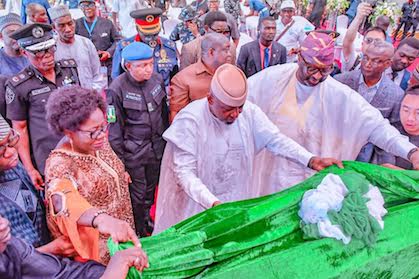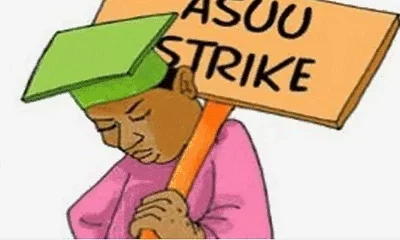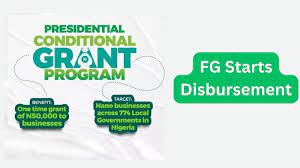Business News
Buhari Commissions Kajola Locomotive Assembly Plant In Ogun

By Tony Obiechina, Abuja
The Federal Government in demonstration of its commitment to revitalize and ensure sustainability of the ongoing railway modernization project has commissioned the Kajola Wagon Assembly Plant in Ogun State.
President Muhammadu Buhari who performed the commissioning of the project, coordinated by the Federal Ministry of Transportation expressed immense pleasure over project which was conceived and flagged off in November 8, 2019, by the Vice President Prof.
Yemi Osibanjo.Furthermore, the President said it will not only generate the needed employment but will boost economic opportunities for the citizenry as it will promote and develop local capacity in Assembling and Manufacturing of Rolling Stock.
The President who was represented by the Minister of Transportation, Mu’azu Jaji Sambo, said the project is in compliance with the Presidential Executive Order No. 5 that stipulates “companies’ involvement in infrastructure development within the country to ensure transfer of technology to Nigeria”.
It is line with this Order that the Federal Ministry of Transportation in March, 2018 signed an agreement with Messrs. China Civil Engineering Construction Company (CCECC) to facilitate the establishment of the plant with the Federal Government providing an enabling environment and necessary support in terms of Tax Waivers, Utilities (Power and Water Supply), Access Road and Rail Sidings amongst others.
According to the President, the Locomotive and Rolling Depot has the capacity to produce 500 Wagons per year of Open Wagons, Container Flat Wagons and Box Wagons, adding that the first set of Wagons assembled in Nigeria are being rolled out for freight services.
The “advantages of setting up the plant is the potential to be provided by the on-going rail projects in the country and Sub-African Region which will generate significant demand for Nigerians Rolling Stock” Buhari observed.
“With the milestone achieved, we are seriously working to open the first University of Transportation in Daura, Katsina State. The intension of this University is to ensure adequate turn out of graduates, technicians, artisans, researchers on different areas of transportation especially railway transportation to guarantee the sustainability of the massive infrastructural provision of this administration on rail transportation” the President assured.
Also speaking at the occasion, the Permanent Secretary, Federal Ministry of Transportation, Dr. Magdalene Ajani, said: “there is no gainsaying that this is one of the landmark legacies of the Administration of President Muhammadu Buhari, designed to ensure the sustainability of railway development in the country”.
While assuring that the Federal Ministry of Transportation will remain committed to full implementation of Government’s Policy on Railway Modernization and expansion of transportation network, she disclosed that it will be done in an environmentally friendly system that engenders socio-economic development of the country.
In goodwill message, the Vice Chairman, Senate Committee on Marine Transport, Sen. Tolulope Odebiyi, said former Governor of Ogun State, Ibikunle Amosu, should be lauded for ensuring that the assembly plant was built in the State.
Odebiyi said that the establishment of the wagon plant would transfer knowledge required for the sustainability of the infrastructure.
He appreciated President Buhari and the Federal Ministry of Transportation for spending the money appropriated judiciously for the completion of the project.
He lauded President Buhari, saying the infrastructure is a legacy that would never never be forgotten.
On his part, Member, National Assembly, representing Ojo Consistency and House of Representative Committee on Marine Transportation, Tajudeen Obasa, said the commissioning of the wagon plant has restored the glory of Nigeria as Giant of Africa.
In his remarks, the Managing Director, Nigerian Railway Corporation (NRC), Fidet Okhiria, who was obviously overjoyed said the plant was a dream come true, adding that it would serve as a source for replacement of faulty wagons instead of sourcing them overseas.
Okhiria, said some wagons had been delivered to NRC for trials, and have been tested and confirmed as meeting international standards.
Business News
NAICOM, RMAFC Collaborate on Economic Diversification

By Tony Obiechina, Abuja
The Commissioner for Insurance and CEO, Mr. Olusegun Ayo Omosehin, and his management team have met with the members of the Constitutional Committee on “Mobilisation and Diversification” of the Revenue Mobilisation Allocation and Fiscal Commission ( RMAFC) led by Engr.
Sani Mohammed Baba, to explore ways of diversifying the Nigerian economy.During their working visit to NAICOM Headquarters, Mr.
Olusegun Ayo Omosehin, in his opening remarks, reaffirmed the critical role of the insurance sector regulator in supervising, regulating, and safeguarding the interests of insurance policyholders.He highlighted insurance’s pivotal role in mobilising savings for long-term developmental projects and enabling businesses to thrive while managing risks effectively.
He also stressed the Commission’s commitment to ensuring insurance companies meet their obligations, thus contributing to the sustainability of the economy.
Speaking, Mohammed Baba emphasised the importance of revenue generation, institutional expansion, and employment creation for Nigerians through collaborative efforts.
The Commissioner for Insurance also acknowledged President Bola Ahmed Tinubu’s ambitious goal of growing the Nigerian economy to One Trillion United States Dollars ($1 trillion) by 2026.
He expressed the insurance sector’s intent to significantly contribute to this objective. Additionally, he mentioned ongoing efforts to embed insurance within the National Credit Scheme to ensure its sustainability.
Omosehin stressed the need for continuous advocacy and sensitization of government institutions about the vital role of insurance in national economic development.
Business News
CBN Unveils Strategy to Boost Remittances, Grants AIP To 14 New IMTOs

By Tony Obiechina, Abuja
The Central Bank of Nigeria (CBN) has activated plans to double foreign-currency remittance flows through formal channels by granting 14 new International Money Transfer Operators (IMTOs) Approval-in-Principle (AIP).
This was disclosed in Abuja on Wednesday, by the Bank’s Acting Director of Corporate Communications, Mrs.
Hakama Sidi Ali, who stated that the initiative will help increase the sustained supply of foreign exchange in the official market by promoting greater competition and innovation amongst IMTOs to lower the cost of remittance transactions and boost financial inclusion.She said, “This will spur liquidity in Nigeria’s Autonomous Foreign Exchange Market (NAFEX), augmenting price discovery to enable a market-driven fair value for the naira.
“It will be recalled that the CBN Governor, Mr. Olayemi Cardoso, had recently declared: “We’ve set ourselves a target to double remittance flows into Nigeria within a year, a goal I firmly believe is within reach.
“We are wasting no time driving progress to remove any bottlenecks hindering flows through formal channels permanently. We have a determined pathway and a sequenced approach to tackling all challenges ahead, working hand in hand with key stakeholders in the remittance industry,” she stated.
Continuing, Sidi Ali, said that the CBN viewed increasing formal remittance flows—one of the major sources of foreign exchange, accounting for over 6% of GDP—as a means of reducing the historical volatility in Nigeria’s exchange rate caused by external factors, such as fluctuations in foreign investment and oil export proceeds.
The increase in the number of IMTOs is one of the primary actions initiated by the CBN’s remittance task force, overseen by Governor Cardoso as a collaborative unit pulling together specialists to work closely with the private sector and market operators to facilitate the ease of doing business in the remittance ecosystem in Nigeria.
The task force was established as a direct result of an executive learning session with IMTOs during the World Bank/IMF Spring Meetings held in Washington DC, United States of America, in April 2024. The task force will meet regularly to implement strategy and monitor the impact of its measures on remittance inflows.
Business News
Tinubu Inaugurates Critical Gas Projects, Reassures Energy Sector Investors

By Matthew Dadiya, Abuja
President Bola Tinubu has reassured investors in the energy sector of his administration’s resolve to further enhance the business environment and ensure investment convenience.
The President spoke Wednesday at the inauguration of three milestone projects, including the expanded AHL Gas Processing Plant; the ANOH Gas Processing Plant, and the 23.
3km ANOH – Obiafu-Obrikom-Oben (OB3) Custody Transfer Metering Station Gas Pipeline.In a speech during the virtual inauguration of the projects at the State House, Tinubu also assured citizens that his administration is stepping up its coordination of other landmark projects and initiatives that will ensure the earliest realization of gas-fueled prosperity in the country.
The President, according to a statement by Special Adviser on Media and Publicity, Ajuri Ngelale, noted that the projects were fully in line with the Decade of Gas Initiative and his administration’s vision to grow value from the nation’s abundant gas assets, while concurrently eliminating gas flaring and accelerating industrialization.
“This event is highly significant to our country as it demonstrates the administration’s concerted efforts to accelerate the development of critical gas infrastructure geared at significantly enhancing the supply of energy to boost industrial growth and create employment opportunities.
“It is pleasing that when these projects become fully operational, approximately 500MMscf of gas in aggregate will be supplied to the domestic market from these two gas processing plants, which represents over 25% incremental growth in gas supply.
“In practical terms, this is more gas to the power sector, gas-based industries, and other critical segments of the economy. I, therefore, commend the strategic vision of the NNPC Limited and its partners, Sterling Oil Exploration & Energy Production Company Limited (SEEPCO) and Seplat Energy Plc, for this laudable and value-adding projects,” President Tinubu said.
The President said his government remains determined in its bid to leverage the nation’s vast gas capacity to drive economic growth.
“Aside from the presidential CNG initiative which is aimed at moving the good people of Nigeria away from petrol and diesel as vehicular combustion fuel, significant progress has also been recorded in incentivizing gas development through Presidential Directives.
“The theme of this inauguration – ‘From Gas to Prosperity; Renewed Hope’, must be adopted by all gas-sector participants and would-be investors as a clarion call to ramp up efforts to accelerate investment and developments of projects in the gas sector on a win-win basis.
“I would once again commend the efforts of NNPC Ltd, alongside SEEPCO and Seplat Energy, on this business partnership initiative, and congratulate you all on the successful implementation of the three projects,” the President said.
President Tinubu also reiterated his government’s resolve to continue to provide support in deepening domestic gas utilization, increase national power generation capacity, revitalize industries, and create multiple job opportunities for economic growth.
“Today, I have the singular honour to inaugurate the expansion of the AHL Gas Processing Plant, the ANOH Gas Processing Plant, and the 23.3Km ANOH to Obiafu-Obrikom-Oben (OB3) Custody Transfer Metering Station Gas Pipeline Projects in line with my administration’s resolve to provide energy for Nigerians, and to use our vast natural gas resources to transform Nigeria,” the President stated.
May 15, 2024



















